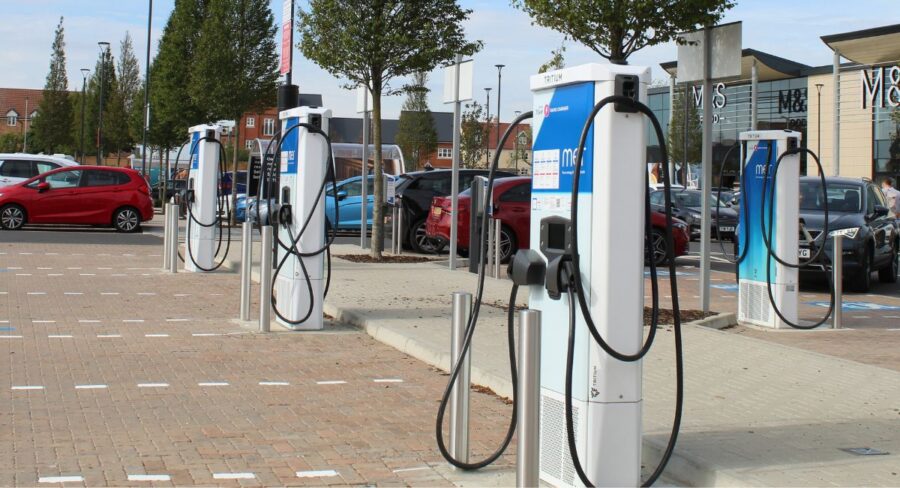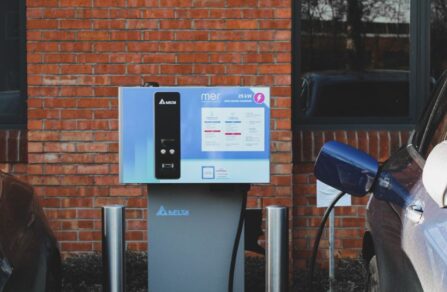
How To Support Employees During an EV Fleet Transition
Electrifying a fleet is an exciting step but can be daunting for ...
In recent years, the UK’s electric vehicle (EV) market has grown rapidly, highlighting the country’s forthcoming shift to a low-carbon transportation system. In 2022, more than 365,000 plug-in hybrid and battery-electric cars were registered, marking a growth of 20% on the previous year.
The increase in EV uptake has not slowed in 2023. In February 2023, BEVs had a market share of 16.5% of all new car registrations.
As costs rise, consumer behaviours are changing, particularly when it comes to spending at retail environments. In January, retail sales volumes dropped at their fastest rate since April 2022. Overall sales for the month volumes stood at 1.4% below pre-pandemic levels recorded in February 2020.
By bringing EV charging to their sites, commercial landowners are opening a unique avenue for revenue potential, as well as revitalising consumer attention and loyalty amidst a decline in retail spend as the cost of living crisis continues.
When EV drivers park and charge their vehicles at retail environments, landowners will receive a direct income through bay renting and the sale of electricity, depending on the financial model they choose with their charge point operator.
Alex Hinchcliffe, Director of Public Charging at Mer UK, outlines the financial opportunities with EV charging and highlights examples of how much landowners can expect to earn through their charge points:
Refuelling an ICE vehicle takes a matter of minutes. On the other hand, EVs take longer to top-up.
Landowners can take advantage of the prolonged time EV drivers will spend at their site whilst their vehicle charges. By installing EV charging, landowners will increase the dwell time of their visitors. This will lead to further opportunities to boost revenue, as increased dwell time can encourage increased expenditure from drivers.
With the opportunity for drivers to explore the shops, go to the gym, grab a coffee and a snack, or do their weekly food shop whilst their vehicle is charging, charging at a retail environment becomes more attractive for drivers.
Your charging infrastructure will also influence the future stability of and opportunities for your site, too. Having had a positive experience charging at your site, your commercial EV charging points will encourage drivers to return the next time they need to top-up on the go, therefore boosting consumer loyalty and attracting people back to your site.
Landowners may question the need for EV charging when low emission vehicles have not yet completely displaced internal combustion engine (ICE) vehicles.
Recognition of the journey of the EV market up to now assures landowners can be confident in the EV industry and, by extension, the return on investment their chargers promise. In 2015, only 1.1% of new vehicles registered were plug-in vehicles. This rose to 3.2% in 2019, and a huge 22.9% by the end of 2022. This trajectory of the EV market share over time highlights the capability the EV market has to become the leading choice of transport for UK drivers.
As more and more drivers make the switch to electric mobility, demand for the use of commercial EV charging points will indefinitely rise. Mer witnessed this increasing demand at Stane Retail Park, a 15-acre retail park in Colchester, Essex, which is home to outlets including B&Q, Aldi, M&S and Mountain Warehouse. The initial development saw the installation of three 75kW rapid chargers and two 22kW fast chargers at the site. Before long, cues started to appear for the chargers, as more and more EV drivers looked to charge their vehicles there.

Stane Retail Park
This demand prompted a second phase in the EV charging development with The Churchmanor Estates Company Plc, the park’s owners. An additional four 75kW rapid chargers were installed at the site, which takes the total number of charging bays to 18.
The need to accelerate the EV charging offering at Stane Retail Park in line with demand not only evidences the growing need for EV charging, it also affirms the strong potential EV charging has for revenue generation in the long term.
Beyond the intrinsic financial benefits of EV charging, commercial landowners must consider the need to install chargers from a regulatory perspective.
UK building regulations now require every new commercial and residential building with an associated parking space to install one EV charging point. New commercial buildings undergoing a major renovation with 10+ parking spaces are also required to have one charge point for every five spaces. What is more, 2025 will bring additional regulations in, as existing commercial buildings with more than 20 parking spaces will require a minimum of one charge point.
EV charging also enables landowners to meet the expectations of current and prospective retailers. As EVs affirm their place in the UK’s transportation sector, tenants of a commercial environment are likely to prefer to occupy sites which offer EV charging than sites that do not.

Electrifying a fleet is an exciting step but can be daunting for ...

As electric vehicle use becomes more widespread, charging facilit...

From meeting your corporate social responsibility goals to prepar...